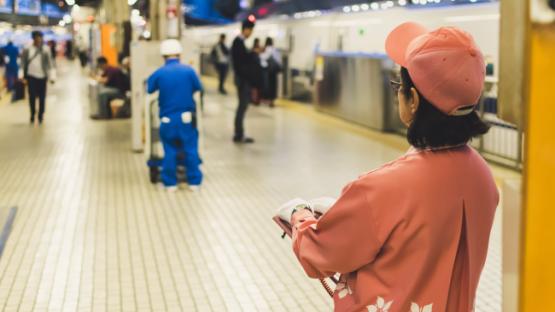
Photo by Jase Bloor on Unsplash
The same techno-solutionism that emerged in the earlier phases of the Coronavirus response is moving into the workplace.

Photo by Jase Bloor on Unsplash
As parts of the world are preparing to go back to factories, offices, and other workplaces, or in the case of Amazon, trying to make continually unsafe workplaces less hazardous, we must be on the watch yet again for profiteering, data-grabs, and surveillance as a solution to an undefined problem.
Many of the measures are predicated on the idea of catching employees who are sick. But, why do employers think that employees are or will lie about their health? Is it because they love their jobs soooo much or is it because employees risk destitution if they don't come to work?
Is the answer actually more technology? Or is it adequately paying and supporting their workplace, with age old, and hard won innovations - like sick pay?
When China began going back to work, some journalists were capturing the measures in place. According to the Financial Times, Chinese apps that classified all workers by colour codes based on opaque algorithms were madatory for all workers in Hangzhou. [FT, April 2, 2020] The app becomes central to peoples’ livelihood.
Similarly in India the GPS-based app is reported to be mandatory for all workers, and Europe has begun to build its own apps (though none are yet mandatory). The question then arises: if the apps are key to people's economic livelihood, the apps need to work, and work for everyone.
But generally, we've seen a low percentage of populations downloading the apps that have been released. That means that the apps aren't fulfilling their own brief, whether because of a lack of public trust, policy failure, or tech failure. Many of the apps currently under consideration don't work reliably on older or cheaper devices - meaning those most at risk won't be able to download the app even if they wanted to.
In the imaginary universe where the apps did work, what then? That is, if a contact-tracing app indicates that you have been in contact with someone who was unwell, does that mean that your employer will respect the app’s indication and let you stay at home without financially punishing you and your family? Or will your employer still require you to come to work?
The idea of putting sensors throughout the workplace has long been an ambition of employers seeking to control their workers and monitor efficiency. The Coronavirus appears to be the latest excuse.
Just as the surveillance industry offered governments expansive surveillance tools to monitor lockdowns, they’re priming themselves for the workplace.
There are some firms selling Bluetooth beacons to enable contact tracing in the office. Yet this would compromise and abuse any government-sponsored Bluetooth contact tracing app, by collecting everybody’s device’s unique identifiers, and in turn allowing employers to determine who was sick; and thus potentially breaking the promised privacy of these apps.
One journalist at the New York Times trialled software that monitors people as they work from home - taking a screenshot every few minutes, and mapping his location. Ultimately the software failed on it's own terms, as it didn't meaningfully capture productivity - but did shift the surveilled journalist's behaviour to less productive tasks that would be visible to the software.
And there's more. A couple of weeks ago, journalists revealed how Amazon has purchased heat scanning technology to use on their staff. According to Reuters, Amazon bought the cameras from a firm the US Government previously blacklisted over allegations it helped China detain and monitor the Uighurs and other Muslim minorities.
Amazon’s response is that they were using many suppliers to "support the health and safety of our employees, who continue to provide a critical service in our communities." So remember, workers, the temperature scanner is there for you. IBM and Chrysler are also listed by Reuters as using the tech.
The truth is that coronavirus is asymptomatic in a lot of people, and has a long incubation period anyway. And bodily temperature changes aren’t just about being “unwell”; body temperature changes during menstruation cycle, for example.
Temperature scanning isn’t necessarily helpful for identifying if someone is contagious; it identifies when people may be unwell, and to be clear, if they have a temperature and are carrying Covid-19, they would know already.
If staff are still showing up to work and are unwell, as an employer you’re dealing with deeper problems. In fact, you may be the problem.
‘Solutions’ such as these, come in a wider context of increased workplace monitoring and surveillance - generally bringing promises of efficency and productivity, with little regard for workers rights and well-being.
There is also the risk of exacerbating existing inequalities - often the most surveilled work places, whether in a warehouse, a call centre or as a delivery driver - are those where people’s job security and rights are the most precarious and these tools and data, can be used as a tool to target and sanction.